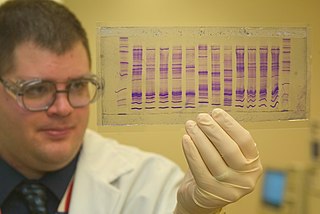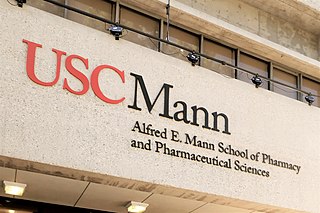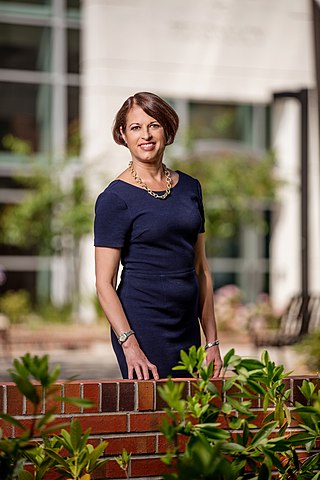
Forensic science, also known as criminalistics, is the application of science to criminal and civil laws. During criminal investigation in particular, it is governed by the legal standards of admissible evidence and criminal procedure. It is a broad field utilizing numerous practices such as the analysis of DNA, fingerprints, bloodstain patterns, firearms, ballistics, toxicology, and fire debris analysis.

Forensic pathology is pathology that focuses on determining the cause of death by examining a corpse. A post mortem examination is performed by a medical examiner or forensic pathologist, usually during the investigation of criminal law cases and civil law cases in some jurisdictions. Coroners and medical examiners are also frequently asked to confirm the identity of remains.
A Doctor of Pharmacy is a professional doctorate in pharmacy. In some countries, it is a doctoral degree to practice the profession of pharmacy or to become a clinical pharmacist. In many countries, people with their Doctor of Pharmacy are allowed to practice independently and can prescribe drugs directly to patients. A PharmD program has significant experiential and/or clinical education components in introductory and advanced levels for the safe and effective use of drugs. Experiential education prepares graduates to be practice-ready, as they already have spent a significant amount of time training in areas of direct patient care and research.

Forensic toxicology is the use of toxicology and disciplines such as analytical chemistry, pharmacology and clinical chemistry to aid medical or legal investigation of death, poisoning, and drug use. The primary concern for forensic toxicology is not the legal outcome of the toxicological investigation or the technology utilized, but rather the obtention and interpretation of results. A toxicological analysis can be done to various kinds of samples. A forensic toxicologist must consider the context of an investigation, in particular any physical symptoms recorded, and any evidence collected at a crime scene that may narrow the search, such as pill bottles, powders, trace residue, and any available chemicals. Provided with this information and samples with which to work, the forensic toxicologist must determine which toxic substances are present, in what concentrations, and the probable effect of those chemicals on the person.

Forensic chemistry is the application of chemistry and its subfield, forensic toxicology, in a legal setting. A forensic chemist can assist in the identification of unknown materials found at a crime scene. Specialists in this field have a wide array of methods and instruments to help identify unknown substances. These include high-performance liquid chromatography, gas chromatography-mass spectrometry, atomic absorption spectroscopy, Fourier transform infrared spectroscopy, and thin layer chromatography. The range of different methods is important due to the destructive nature of some instruments and the number of possible unknown substances that can be found at a scene. Forensic chemists prefer using nondestructive methods first, to preserve evidence and to determine which destructive methods will produce the best results.
The following outline is provided as an overview of and topical guide to forensic science:
The University of Cincinnati Academic Health Center (AHC) is a collection of health colleges and institutions of the University of Cincinnati, Cincinnati, Ohio. It trains health care professionals and provides research and patient care. AHC has strong ties to UC Health, which includes the University of Cincinnati Medical Center and West Chester Hospital.

The University of Florida Institute of Food and Agricultural Sciences (UF/IFAS) is a teaching, research and Extension scientific organization focused on agriculture and natural resources. It is a partnership of federal, state, and county governments that includes an Extension office in each of Florida's 67 counties, 12 off-campus research and education centers, five demonstration units, the University of Florida College of Agricultural and Life Sciences, three 4-H camps, portions of the UF College of Veterinary Medicine, the Florida Sea Grant program, the Emerging Pathogens Institute, the UF Water Institute and the UF Genetics Institute.
College of Pharmacy is part of the University of Arizona, a public university in Tucson, Arizona, United States. It is the only pharmacy school at a public Arizona university and one of four health professions colleges at the Arizona Health Sciences Center campus. The college is accredited by the Accreditation Council for Pharmacy Education.
The basic requirement for pharmacists to be considered for registration is often an undergraduate or postgraduate pharmacy degree from a recognized university. In many countries, this involves a four- or five-year course to attain a bachelor of pharmacy or master of pharmacy degree.

The University of Florida College of Pharmacy is the pharmacy school of the University of Florida. The College of Pharmacy was founded in 1923 and is located on the university's Gainesville, Florida main campus. The college offers the entry-level Doctor of Pharmacy (Pharm.D.) degree as the first professional degree for students entering the profession. The college offered a Working Professional Pharm.D. (WPPD) program for bachelor's-trained pharmacists already in practice with its last cohort of students enrolled in 2016. Additionally, various graduate degrees are offered. The professional program is fully accredited by the American Council on Pharmaceutical Education. Since 2011 the college has been offering online degree programs at the graduate level, such as the Forensic Science Program, Pharmaceutical Chemistry Program and Clinical Toxicology Program. In total the College of Pharmacy received over $32 million in total Research Revenues in 2021.

The University of Florida College of Veterinary Medicine is the veterinary school of the University of Florida in Gainesville, Florida. The college only enrolls professional program D.V.M. students and graduate students pursuing M.S. or Ph.D. degrees. No undergraduates are enrolled in the college.

The Harris County Institute of Forensic Sciences is a science-based, independent operation consisting of two distinct forensic services for the Harris County community – the Medical Examiner Service and the Crime Laboratory Service. The institute is located in Houston, Texas. The institute is a part of the Texas Medical Center.

The University of Florida's (UF) online clinical toxicology distance education programs cater to working professionals, including physicians, nurses, physician assistants, first responders, and poison control center professionals. The programs focus on toxicants, drugs of abuse, drug analysis, and biotransformation, as well as the treatment of poisoned or overdosed patients. Classes are taught by internationally recognized faculty with expertise in clinical toxicology, medicine, pharmacy, and pharmacology.

The University of Florida's (UF) online pharmaceutical chemistry distance education programs cater to working professionals and students who have completed their Bachelor of Science degrees.
The Punjab Forensic Science Agency is a government agency under the Home Department, of the provincial Government of Punjab of Pakistan. It provides forensic science services primarily to law enforcement in the province. The Punjab Forensic Science Agency act was passed by the Punjab Assembly on 4 October 2007; assented to by the Governor of Punjab on 29 October 2007; and, was published in the Punjab Gazette (Extraordinary), dated 30 October 2007.
Ramaiah University of Applied Sciences (RUAS) is a UGC approved Private University in India.It was created by an act in the State of Karnataka, India and was established in December 2013.

The USC Alfred E. Mann School of Pharmacy and Pharmaceutical Sciences is the pharmacy school of the University of Southern California, originally established in 1905 as USC College of Pharmacy. On November 17, 2022, the University of Southern California released an announcement stating that the school will be renamed the USC Alfred E. Mann School of Pharmacy and Pharmaceutical Sciences and will receive a $50 million endowment for student scholarships, faculty recruitment and integrating a university-wide research infrastructure related to biomedical innovation across USC’s University Park and Health Sciences campuses. The School is led by Dean Vassilios Papadopoulos.

Julie Ann Johnson is an American clinical pharmacist and translational scientist. She currently serves as associate dean for clinical and translational research and holds the Dr. Samuel T. and Lois Felts Mercer Professorship of Medicine and Pharmacology at The Ohio State University College of Medicine. She is also be associate vice president for research at Ohio State. Johnson comes to Ohio State from the University of Florida, where she was dean emeritus of pharmacy and a distinguished professor of pharmacy and medicine in the Department of Pharmacotherapy & Translational Research. For four consecutive years, she was a Clarivate Analytics Highly Cited Researcher in Pharmacology and Toxicology, indicating she was one of the "world's leading scholars in the sciences and social sciences in the preceding decade."










